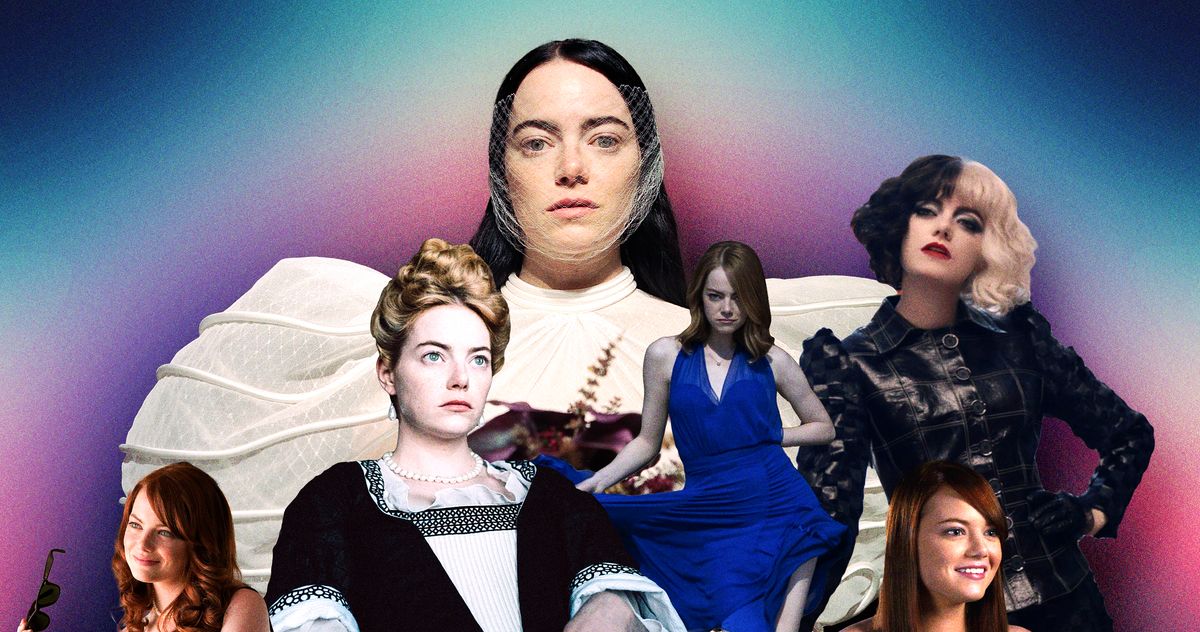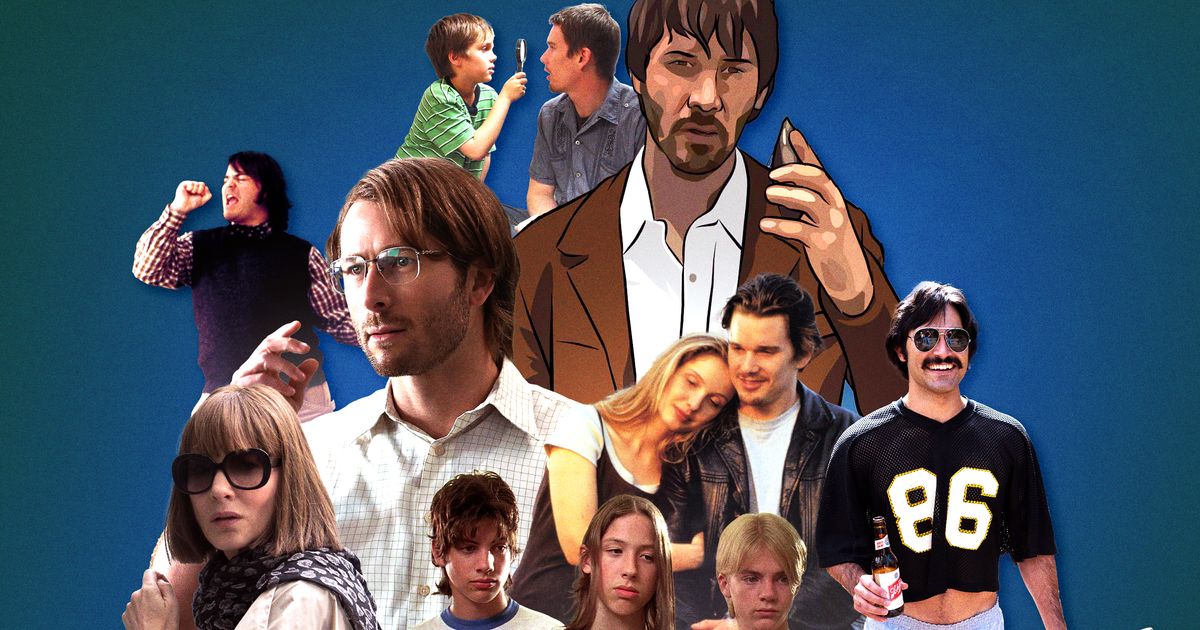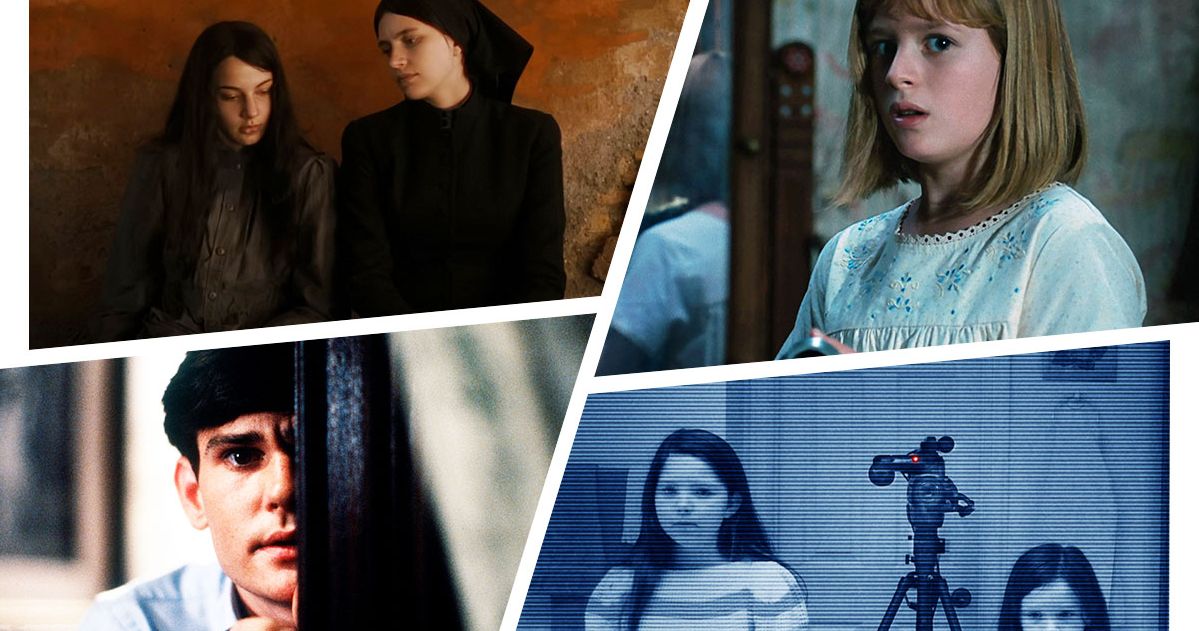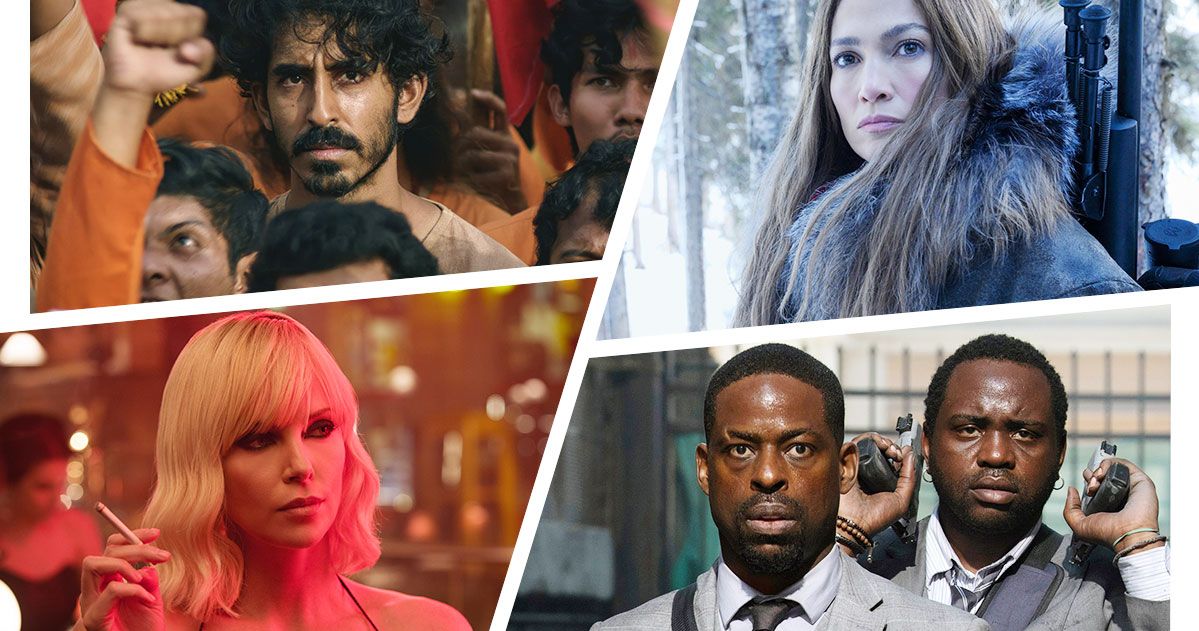Photo-Illustration: Vulture; Photos: Disney, Lionsgate Films, Searchlight Pictures
This list was originally published on September 20, 2017. It has been updated to reflect new releases, including Kinds of Kindness.
Emma Stone has said her idol, and role model, as an actress is Diane Keaton, and it makes total sense: Now that you’re thinking about it, it’s hard not to connect them, right? Like Keaton, Stone is instantly likable, dazzlingly funny — you can make an argument she’s a comedienne first and foremost — and relatable while never losing that star wattage. In the span of a decade, she went from making her debut (in Superbad) to being a beloved Hollywood fixture and an Oscar winner to boot. But also like Keaton, it’s not difficult to imagine her expanding on this, pushing herself while never losing that inherent affability. She’s one of us while being the best of us … which is an excellent definition of a movie star.
In this week’s Kinds of Kindness, she takes on three characters, the latest wrinkle from an actress who has been game for anything, whether that means playing straight comedy, wacky supporting roles, or femme fatales. It’s going to be extremely fun updating this list as the years go forward — after all, look where Keaton went. Who’s to say Stone can’t go just as far … or further?
Here are her 23 roles, ranked. We omitted bit parts — though we love her in Popstar: Never Stop Never Stopping — and voice roles (although she’s awfully fun in The Croods). And we didn’t include The Curse since that’s television. But no matter how you choose to measure it, she’s had a pretty great career already.
It’s insane to think there was a time in human existence that Bradley Cooper, Josh Gad, Christine Applegate, Jane Lynch, Jason Sudeikis, Will Arnett, Fred Armisen, Aziz Ansari, Demetri Martin, Keir Gilchrist and Emma Stone all played supporting characters in a movie that starred Rainn Wilson, but, hey, 2008 was quite a year. Stone has a thankless, off-brand role as a moping member of a teenage rock band who drafts a former drummer in a Metallica-esque band (Wilson) to fill in so they can play their school prom. This thing is junky — and it’s not Wilson’s fault he has to do so much heavy lifting, in his underwear no less — and Stone escapes dignity intact, barely, from the wreckage.
Stone spent two years trying out the role of Woody Allen’s modern muse, not unlike Scarlett Johansson the decade before, but her stint didn’t come with any Match Point–style breakthrough: The two movies she made with Allen were among the director’s most formulaic work. She struggles particularly here as a “mystic” who performs illusions and inspires a cynical fellow magician (Colin Firth), briefly, to suspend his disbelief. Certain actors benefit from Allen’s hands-off approach, but Stone might not be one of them. She looks lost and flailing most of the time, forced to carry way too much of the narrative and the film’s attempts at charm. Stone isn’t necessarily to blame — Magic in the Moonlight is a minor trifle, even for late-career Allen — but this just isn’t a great fit.
If you don’t remember Gangster Squad, it’s the other nostalgic, old-school-Hollywood-themed movie in which Stone plays an aspiring actress who moves to Los Angeles to become famous and falls in love with Ryan Gosling. Of her three collaborations with Gosling, this one is easily the worst. A limp attempt at recapturing the snarl and sex appeal of a bygone era’s gangster pictures, the film mostly feels like an excuse for big names to play dress up in fedoras. Stone isn’t terrible as Grace, the girlfriend of an infamous crime boss (Sean Penn) who starts to have feelings for the cop (Gosling) who’s helping to bring him down. But despite the timeless nature of her appeal in most roles — you get the sense that she could have been a star in any era — she doesn’t quite convince as a noir-ish love interest.
Stone only really has one scene here, but it’s a silly, fun one: She gets to break up with Justin Timberlake and then leave the movie all together. It’s worth noting that her male counterpart, the guy breaking up with Mila Kunis, is Andy Samberg. Stone is clearly here as comic relief, and it’s telling that the movie (ostensibly a comedy) trusts her to carry that responsibility on her own. Stone and Samberg would have the opportunity to reconnect a few years later with her cameo in Popstar, and even though that part is too slight to make this list, it’s even funnier. (“Turn up the beef!”)
The better of Stone’s two Woody Allen films, Irrational Man finds her playing a bright, impressionable college student who’s smitten with her brilliant, morose philosophy professor (Joaquin Phoenix), who starts developing feelings for her, too. If Magic in the Moonlight was Stone’s chance at a frothy Allen period comedy, Irrational Man is more Crimes and Misdemeanors, analyzing morality, guilt, and the absence of God in the midst of a murder plot. Stone’s role is crucial — she comes to understand just how troubled and dangerous her teacher is, and must take action — but the actress doesn’t bring enough gravitas to this drama. Her effervescence gets reduced to blandness in Allen’s movies, which ultimately feels more like his issue than hers.
Our mild defense of Stone’s notorious casting as Allison Ng, an Air Force captain whose father is half-Hawaiian and half-Chinese, is that part of the joke of the character is that she loves bragging about her ethnically diverse background — even though she looks like, well, Emma Stone. But that joke, like many in Aloha, isn’t particularly good, and it also doesn’t help that Stone plays Allison with a little too much earnest adorableness, never establishing much of a rapport with Bradley Cooper’s spiritually adrift military contractor. (That’s a problem, considering they’re supposed to fall in love.) Stone has since apologized for her part in the whitewashed casting, satirizing herself during a 2015 SNL skit in which she auditions for Star Wars based on her ability to play Asian characters. It’s a sign of how flawed Aloha is that its best moment comes when Stone dances with Bill Murray to Hall and Oates’ “I Can’t Go for That (No Can Do).” She’d show off more dance moves in a better movie a year later.
A rambling, moody, mostly dull middle-aged-white-guy-in-crisis movie about a blocked writer (Jeff Daniels) with an imaginary superhero friend (Ryan Reynolds), Paper Man only comes to life when Stone is onscreen as a teenage girl who befriends this sad-sack after losing her twin sister. Daniels is morose and whiny and Reynolds is hammy and over-the-top, which allows Stone to steal the movie, giving it its only modicum of zest and soul. She’s too good to be the fantasy of some old white guys, and soon, she wouldn’t have to be.
This star-studded Kentucky Fried Movie homage — seriously, how did this movie get Hugh Jackman, Kate Winslet, Halle Berry, Chris Pratt, Dennis Quaid, Uma Thurman, Naomi Watts, and Richard Gere? — only has two decent segments. One is a cruel but admirably strange joke on homeschooling starring Watts and Liev Schreiber, and the other is a gonzo scene in which Stone and Kieran Culkin exchange supercharged sexual banter in a grocery store over the intercom. It’s as dumb as everything else in this movie, but both Culkin and Stone play it perfectly. Check out the way Stone says, “He was a wizard, Neil!” We’re still laughing.
The Marc Webb–Andrew Garfield reboot of the Spider-Man series was pretty much dead on arrival — this might be the least-inspired comic-book sequel since Fantastic Four: Rise of the Silver Surfer — but the one thing that does work is the relationship between Peter Parker and Gwen Stacy. Garfield and Stone were dating in real life during the film, and it’s telling that the movie essentially stops every time they start talking to each other: They’re incredibly charming. Unfortunately, the comic-book gods must be fed, and thus, the lousiness of the rest of the movie and the end of a franchise flirtation that, all told, Stone is probably pleased to be rid of.
Stone plays the actual ghost-girlfriend of the title — a character named Allison who visits Matthew McConaughey’s slick bachelor and shows him the error of his ways with the women in his past. She has crazy wigged-out hair and braces, but she’s also quick and goofy in a way that McConaughey isn’t: This was right before the McConaissance, back when he was still mailing in stuff like this. It’s a small part, but Stone makes it count. When the movie is looking for a final joke beat at the end, it goes back to her, the one person who consistently provided them.
A little more than 10 years after killing her first starring vehicle (Easy A), Cruella demonstrates how far Stone has come. Playing the future Cruella de Vil in an origin story nobody asked for, she’s at the peak of her movie-star powers as she rocks a British accent and struts through scenes as her glammed-out alter ego, happily wrapping the film around her finger. It’s a showy performance, but because there remains something so self-effacing and charming about her, it’s never overindulgent — you’ll get a kick out of how much of a ball she’s having. Unfortunately … this is an origin story nobody asked for, and the filmmakers have given her so little to work with that she has to do all the heavy lifting herself. This may be the first time that one of her films was too small to contain her.
One of the most underrated and endlessly rewatchable comedies of the last 15 years, The House Bunny is so stupid/funny/sweet that it’s impossible to resist. That’s especially true of Stone as Natalie, a delightfully nerdy member of a loser sorority that’s transformed by the dim-bulb beauty Shelley (Anna Faris), who’s been kicked out of the Playboy Mansion. This geek-to-chic comedy was meant to be Faris’ big breakthrough, but Stone holds her own as the nerdy straight woman to Shelley’s ditzy, kindhearted stupidity. They’re a terrifically funny pair as Stone perfected her adorkable persona just as major stardom beckoned.
One of the reasons you like Jonah Hill’s Seth in this movie — even though he’s disgusting, he says horrible things about women, and he can’t even steal a keg properly — is because of the great taste he has in his idealized crush. Stone’s Jules is smarter and kinder than everyone else in the movie. She has her shit together, yet she’s just silly enough to find Seth sort of charming, in spite of herself. This was her first movie role. Who wouldn’t want to see more?
If this irritatingly cutesy rom-com had focused more on Emma Stone and Ryan Gosling’s story line, we would have liked it a lot more. The rest of the film strains to be profound about how screwy love can be, but she’s a delight as Hannah, a goody-goody law-school grad who decides she’s had it with her noncommittal boyfriend and takes a chance on Jacob, a seductive womanizer who’s blessed to look like Ryan Gosling. Like several Stone roles, Crazy, Stupid, Love. allows her to start off as slightly nerdy before she gets to show off her wilder side — which, naturally, is still kinda nerdy but very endearing. Hannah may be uptight, but she’s funny as hell, and Stone’s wiseass attitude is on great display when she convinces him to take off his shirt, losing her mind after she finally checks out his abs. The highlight of the movie comes later in the same scene, when Stone and Gosling re-create Dirty Dancing’s most famous moment (with the help of a body double). It’s light on its feet, but also very sexy.
This is another supporting role, but she brings her no-nonsense, brash-but-so-fun persona to the next level as one of the few survivors of the zombie holocaust, foraging throughout the bombed-out landscape with Jesse Eisenberg, Abigail Breslin and Woody Harrelson. (And Bill Murray, of course.) This is a minor part, but she makes it a major one: She grabs the funky, off-kilter Zombieland and ramps it up into something soulful and warm. It was exciting to watch a star being born — while the best you can say about the ill-advised sequel is that, even though she was by then way too famous to be doing something like this, she still seemed to give it her goofy all.
Tate Taylor’s surprise monster hit could have been cloying and white-savior-y — and at times it is — but Stone grounds it with her ability to play characters who are screw-ups and awkward and gangly but also glamorous and more capable than just about everyone else around them. Impressively, she knows when to step aside and cede to her co-stars, giving Octavia Spencer, Viola Davis, and Jessica Chastain the room they need to lead the movie … before reeling it back in to keep the movie centered. It’s a quietly impressive performance, and the mark of a true star.
Stone couldn’t have known at the time — Battle of the Sexes was shot before La La Land’s awards campaign really got rolling — but this crowd-pleasing biopic is the perfect soft landing after that Oscar-winning game changer. Here, she plays Billie Jean King, the best player in women’s tennis in the early 1970s, who decides that she and her tour mates shouldn’t be paid so much less than their male counterparts. The film is a feminist parable that can sometimes be too rah-rah — favoring sentiment over nuance — but Stone supplies the heart, showing us a woman fighting for equality but also wrestling with her sexuality, getting involved with a beautiful hairdresser (Andrea Riseborough) but keeping the relationship under wraps for fear of angering fans and promoters. In future years, Battle of the Sexes may be the movie we point to where Stone pivoted away from her more adorable roles to something a little more grown-up and weary. Her King is intelligent and cutting, but she’s also a person who seems to be looking for something just out of reach, which gives the performance real poignancy. Stone and Riseborough’s tentative romance is sensual in a relaxed way; it’s the film’s emotional centerpiece. And when King finally faces off with that showboating Bobby Riggs (Steve Carell) in the finale, Stone guides her character to an ending that’s more emotional and tempered than one might expect — even if you know how their match ended up in real life.
Stone received her first Oscar nomination for this Best Picture winner, playing Michael Keaton’s prickly daughter Sam, who’s a recovering addict and a hell of a flirt. Birdman was a major changeup for Stone: She’d done other dramas, but she’d never seemed this dangerous. Shedding her cutie-pie image, Stone convincingly berates her character’s delusional father, and then practically steals the movie during a rooftop scene with Edward Norton’s vain leading man. In a movie that, for better and for worse, is a celebration of flashy virtuosity, Stone is a stealth missile, blowing up every scene she’s in.
As you’ll notice from the top rungs of our rankings, we are very high on Stone’s recent collaborations with Yorgos Lanthimos, which have found her enjoying great success while pushing herself into daring new terrain. After winning her second Oscar for Poor Things, she and the Greek director reunited for this freewheeling, super-dark lark that consists of three short films in which Stone and other cast members play different characters in each. The second and third shorts, “R.M.F. Is Flying” and “R.M.F. Eats a Sandwich,” are the ones in which she takes center stage, and she’s predictably terrific as, respectively, a wife lost as sea who returns home (but may not be herself) and a cult member in search of a strange woman. Perhaps you’ve come to expect a certain degree of twisted weirdness from Stone when she hooks up with Lanthimos, but Kinds of Kindness proves that there’s still plenty of nuttiness for her to explore. None of her three performances in this triptych is like the others, and each is a dazzling, tightly controlled tour de force. Plus, nobody dances like her.
As a rule, we tend not to get hung up on so-called category fraud when it comes to which actor gets positioned as the lead for Oscar consideration. That said, as great as Olivia Colman is in The Favourite, technically speaking Emma Stone’s character, the conniving Abigail, is the real main character, driving the action forward and worming her way into the Queen’s heart (and bed). The edginess that Stone brought to her role in Birdman was sharpened for this film, resulting in a darkly comic turn that’s also surprisingly touching. (As much as Abigail is using Queen Anne, she does have some sympathy for this ailing, lonely woman.) Much has been made of the fact that Yorgos Lanthimos’ spiky comedy is like an 18th-century All About Eve, which means Stone is in the Anne Baxter role, and it’s delicious watching this poisonous schemer get exactly what she wants — and still receive the comeuppance that she so richly deserves.
This teen riff on The Scarlet Letter was Stone’s first starring role, and she later admitted that the stress of making it led to many sleepless nights. You’d never know from watching the breezy, sneakily emotional Easy A, which is the epitome of Stone’s sweet-and-spiky persona. She plays Olive, a precocious, misfit 17-year-old who lies about losing her virginity, which suddenly makes her unexpectedly popular. Even when the movie’s inspiration starts to flag, Olive is such a likable, original teenager — smart but sensitive, funny but vulnerable — that she’s like a magnet pulling you into the screen.
Stone’s second collaboration with Yorgos Lanthimos is even wilder than the first, finding her delivering a master class in physical comedy as a naïve innocent named Bella whose body was fished out of the river after she committed suicide. Now reawakened by Dr. Baxter (Willem Dafoe), a mad scientist who lives for his unholy experiments, she doesn’t know who she once was, babbling like an idiot and exuding the emotional intelligence of an infant. But Bella is a quick study, whisked away by a horny lawyer (Mark Ruffalo) in this jet-black comedy, which may be the purest expression of her irreverent, inspired goofball side. She’s a revelation in Poor Things, navigating Bella’s sexual and personal evolution over the course of the film, transforming from a naïf to a fully empowered young woman, consistently hilarious throughout. The movie lets Stone rip, proving that despite winning an Oscar, she’s not afraid to still take big swings. This one she knocks out of the park, and got Academy Award No. 2 in the process.
Many actors win their Oscar for a role that’s not close to their finest work. Happily, that’s not the case with Emma Stone. She’s never been better than she was as Mia, a struggling young actress who’s trying to find herself just as she falls for a suave jazz pianist (Gosling, again). La La Land has been debated, dissected, mocked, and scorned, but the film’s many critics haven’t really complained about Stone. That’s because she’s perfect: Hollywood is full of starlets, but none have just the right combination of wide-eyed optimism, snarky wit, and gal-next-door sweetness that Stone brought to the performance. Which moment in this nostalgic, bittersweet musical won her the Best Actress Oscar? Was it when she and Gosling tap-dance in the Hollywood Hills, or when they swirl among the stars at the Griffith Observatory? Was it the teary speech where Mia admits that maybe she’s not talented enough to make it? All are indelible, but the answer has to be “Audition (The Fools Who Dream),” in which Mia gives the casting directors (and the audience) a four-minute primer on her hopes, fears, and upbringing. Right there, you see an actress who is finally tapping into the greatness that’s always been inside her, just dying to come out. That applies to Mia as much as it does Stone, who, with La La Land, turned her lovable, indomitable spirit into something timeless.
Grierson & Leitch write about the movies regularly and host a podcast on film. Follow them on Twitter or visit their site.















